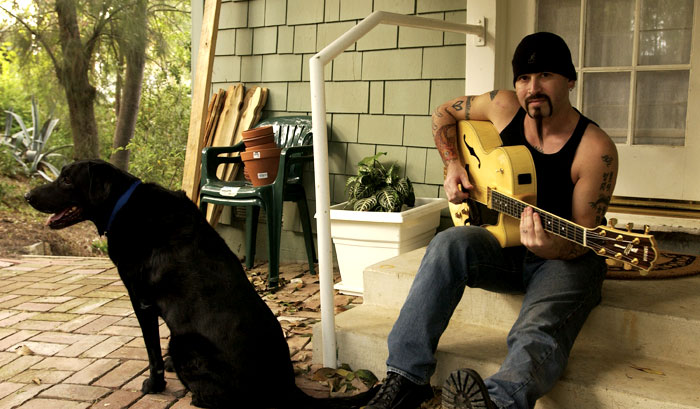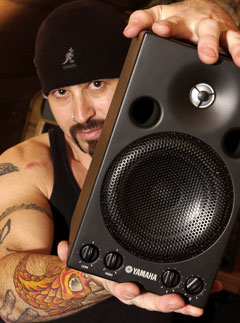


When Michael Herring was five years old, his violinist grandfather paid him a dollar a week to take guitar lessons.
It was a shrewd investment. Today Herring commands a substantially higher weekly wage when he tours with the likes of Christina Aguilera, Anastacia, and Prince or adds guitar tracks to discs by NAS, Dru Hill, Mariah Carey and others.

Herring, who usually goes by the nickname Fish, credits much of his stylistic depth to coming of age in Philadelphia. "Philly has such a rich musical legacy," he says, speaking from Europe shortly after an Anastacia performance at Rome's Coliseum. "I was fortunate to play with and learn from so many talented musicians there, and the music schools were outstanding. I had master classes and jazz workshops with Grover Washington, Jr., and Stanley Clarke when I was about fifteen-amazing experiences that changed my life. Philadelphia is also a real working musician's city. There are gigs everywhere, and that helped me realize at an early age that I could make a living doing something I loved."
The Yamaha MSP3s tell me the truth when I'm tracking guitars.
As a maturing guitarist, Fish was influenced by classic rock, fusion, and flamenco. But it was Philly's black music that most strongly shaped his style. "It always just felt right to play R&B, jazz, and gospel gigs," he says. "I craved the musicality and the challenge those styles offered, and I just loved to groove!" Those sensibilities stayed with Fish, even after he relocated to Los Angeles.
These days, Fish is more likely to be deployed on pop and R&B projects than straight-ahead jazz gigs, yet his jazz training still informs his approach. "It's a subconscious inspiration," he explains. "I always believed that it's good to study theory and learn as much as you can. But when you play, you forget about theory and just feel. That way, the knowledge finds its own way into your heart and hands. Jazz, no matter how technical it can get, is all about feel and vibe. The music that the jazz masters of the past left us is the theory, and that music was purely from the heart."
Fish found himself interacting with the past in a somewhat different fashion on one recent project. Producer Claudio Cueni recruited him to create an acoustic guitar backing for an uncompleted track by the late rapper Tupac Shakur. "We recorded several versions of 'Thugz Mansion,'" says Fish, "but in the end we used the original first-take guitars. I also produced a handful of other acoustic remixes based on Tupac a capella tracks, which I hope will be released sometime in the near future. It was an honor to work on that project and be included in the video."
But Fish seems to reserve his greatest awe for his time spent with Prince. "He is simply a genius, both musically and business-wise. Some of my best experiences were just sitting there at Paisley Park watching him work. His work ethic is unbelievable-I'll be striving for that kind of excellence my entire life."
When Fish isn't contributing to someone else's music, he's likely to be creating his own, even when he's on the road. "I travel with a nice little production rig," he says. "I utilize my days off working on various other projects." Fish has created music for films, TV shows, commercials, and video games, and he recently completed a guitar loop sample CD scheduled for release later this year. He's also writing material for a band project he hopes to put together soon.
Whether he's at home or on the road, Fish relies on a pair of Yamaha MSP3 monitors. "I started using them as part of my mobile rig while I was working on patches for Yamaha's Magicstomp multi-effects pedal. I loved them so much that I added them to my home studio. They're nice and flat but real punchy for such a small box. I switch between my old Yamaha NS10s and the MSP3s when I'm mixing, which provides a nice cross-reference. The MSP3s tell me the truth when I'm tracking guitars."
Is it possible to have too much music in your life? Not according to Fish.
"The music is always there," he says. "Even if I'm not onstage or in the studio, there's still music going on inside me. As musicians, we struggle artistically, emotionally, and financially, but we're so connected to what we do that it's more than a job-it's a way of life. Our reality is to live, breathe, eat and dream music. We have no choice-that's what we're here for."
























